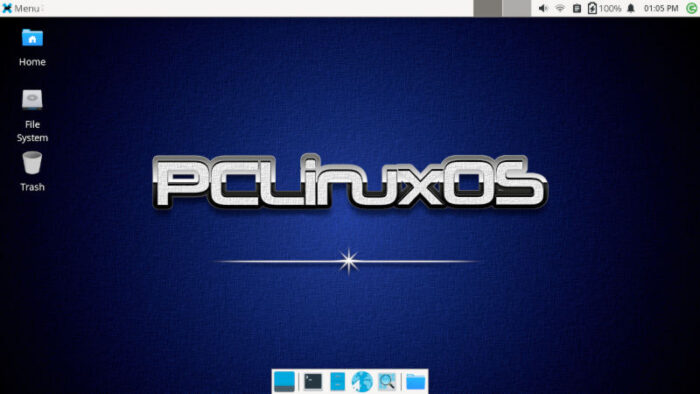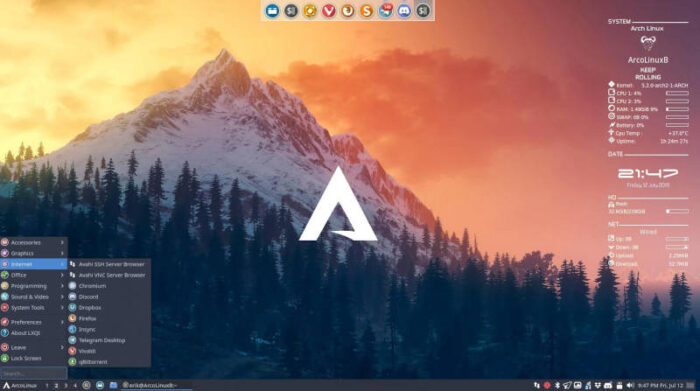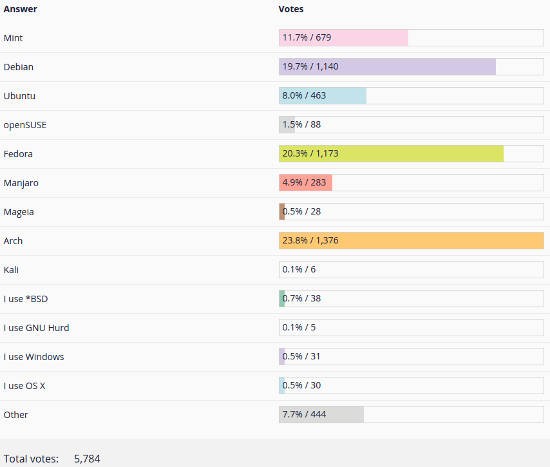Did you miss this week’s top articles? Here are the five most read article on FOSS Force for the week that just ended.
Posts tagged as “Arch Linux”
The update from the Arch Linux project says that details of the attack will not be made available as long as it's still ongoing.
Arch’s AUR has been busy battling DDoS attacks and malware. Trouble’s not over—and it’s anybody’s guess what’s next… if anything.
Another small but well-maintained distro with a dedicated following reaches the end of the trail.
For the second year in a row, Arch Linux wins both rounds in our poll to determine the winner of our Readers’ Choice Award for Best Linux Distro.
The FOSS Force Readers’ Choice Awards Poll
 The readers of FOSS Force have made their voices heard and for the second year in a row you have chosen Arch Linux to be the recipient of the FOSS Force Readers’ Choice Award for Best Linux Distro. The recipient was determined by the results of a poll that opened on January 30 and closed at noon EST today.
The readers of FOSS Force have made their voices heard and for the second year in a row you have chosen Arch Linux to be the recipient of the FOSS Force Readers’ Choice Award for Best Linux Distro. The recipient was determined by the results of a poll that opened on January 30 and closed at noon EST today.
The selection was a two part process that began with a qualifying poll in which readers could suggest distros to be included in the just ended final round of voting. The final round asked the question, “Which of the GNU/Linux distros listed below would you choose to win the FOSS Force ‘Best Desktop Distro’ Award for 2016?”
This year, both rounds of polling set records for our site. As they like to say after political elections, voter turnout was very heavy.
Would you like to use a Raspberry Pi as a topflight security tool? Here’s how to install BlackArch Linux on a Pi to get you on your way.
The Raspberry Pi Report
Currently Kali Linux is the de facto OS for those looking to do security research or penetration testing, but that could be changing in the months and years to come. This month BlackArch Linux, another penetration testing OS, released new ISOs that could put it ahead of Kali. BlackArch now includes over 1,500 tools for penetration testing and security research as well as support for kernel 4.7.1. In the months to come, I’ll write about using select tools from BlackArch on the Raspberry Pi, but in order to get to that point, we first need to install it. Instead of taking any credit for the install steps or reproduce them over again, I’m simply going to provide links to the same steps that I found and followed which lead me to a successful install of both Arch Linux and BlackArch on my Raspberry Pi 3.
In addition to hosting a Raspberry Pi meetup in Washington D.C., Isaac Carter is a co-host on mintCast. He’s also a software engineer who enjoys working with Java, JavaScript, and GNU/Linux. When he’s not coding, you can find him reading on any number of subjects or on the golf course.
Also included: FCC requires TP-Link to allow users to install open source firmware on routers, five new distro releases, new releases of LibreOffice and KDE Plasma, and Microsoft releases Skype 1.3 Alpha for Linux.
FOSS Week in Review
Maybe because we’re in the last 30 days or so of real summer — as opposed to calendar summer — or perhaps because most ‘Mericans are glued to their TVs as the Clinton/Trump heavyweight bout gets underway in earnest, but this has been a slow news week in the FOSS world. However, there are some notable items worth mentioning.
 FCC supports open source Wi-Fi firmware. For the last several months many open sourcers have been up in arms because it looked as if the door was being closed on open source on Wi-Fi routers after the agency changed it’s rules around radio interference on the 5 GHz band, making it difficult for router makers to allow users to install open source firmware on their routers. All along, the FCC claimed that shutting out open source use wasn’t part of the game plan, but we FOSSers are a suspicious lot and we weren’t buying it.
FCC supports open source Wi-Fi firmware. For the last several months many open sourcers have been up in arms because it looked as if the door was being closed on open source on Wi-Fi routers after the agency changed it’s rules around radio interference on the 5 GHz band, making it difficult for router makers to allow users to install open source firmware on their routers. All along, the FCC claimed that shutting out open source use wasn’t part of the game plan, but we FOSSers are a suspicious lot and we weren’t buying it.
Christine Hall has been a journalist since 1971. In 2001, she began writing a weekly consumer computer column and started covering Linux and FOSS in 2002 after making the switch to GNU/Linux. Follow her on Twitter: @BrideOfLinux









